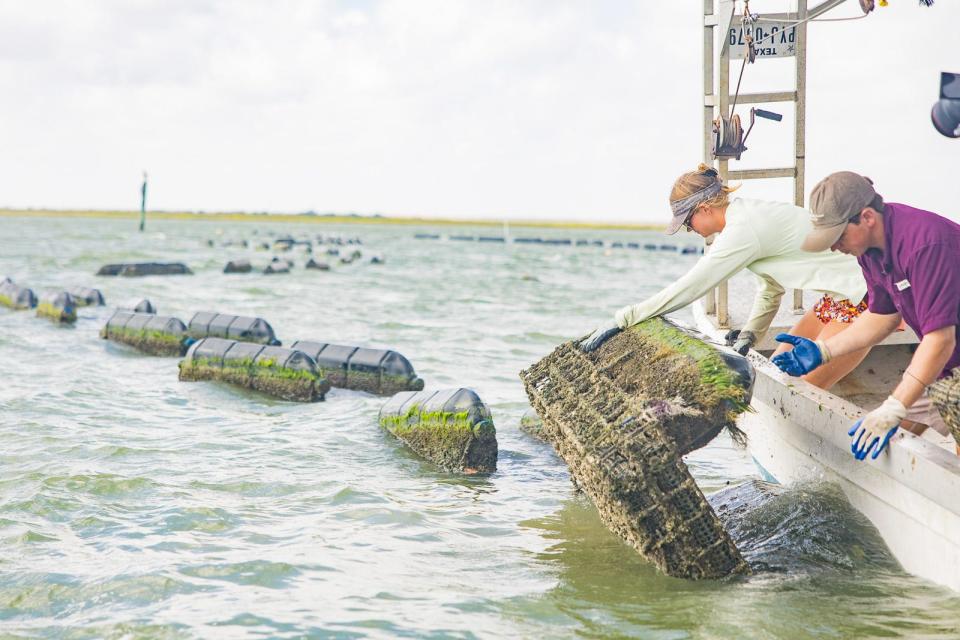Harte Research Institute offers free program to encourage sustainable oyster farming
The Harte Research Institute has created a free online platform to educate those interested in oyster farming in Texas.
The online courses are free, and include the opportunity to apply for a paid internship at a oyster farm or hatchery upon completion of the program.
Texas is the second largest commercial oyster harvester in the country, primarily through the harvest of natural reefs. But as wild harvests have dwindled due to overfishing, freshwater intrusion and hurricanes, oyster farming has been introduced as a sustainable alternative.

Oyster farming has only been legal in Texas for a few years. The first permitted oyster farm in Texas started operations in Copano Bay in fall 2021. The Caller-Times has reported on the first forays of Coastal Bend oyster farmers.
Currently, there are several oyster farms operating in bay waters across the state, including around Copano and Aransas bays, Tres Pelacios Bay and West Bay and East Bay near Galveston.
Baby oysters rely on reefs made of oyster shells to grow and thrive. Oyster reefs are typically found in upper bay areas with moderate salinity. Changes to salinity, which can happen as the result of a storm, and overharvesting can harm oysters.
During harvests, shells are removed from the reefs, impacting future generations of oysters which need that habitat in order to grow and thrive.
The decline of oyster habitat is also an environmental concern. Oysters are filter-feeders that clean and clear water. Additionally, oyster reefs provide a habitat for other small organisms that in turn attract larger fish.
The Texas Parks and Wildlife Department has closed several bays along the Texas cost to wild harvest, including St. Charles Bay in Aransas County where the Harte Research Institute has successfully worked to restore reefs using recycled oyster shells from restaurants in Corpus Christi and Port Aransas, along with crushed rock and concrete.
Oyster farming is an alternative to wild harvest. Oyster farms rely on seed oysters from a hatchery. Instead of growing in a natural reef, farmed oysters are grown in cages.
According to Texas Parks and Wildlife, there is no nutritional difference between farmed or wild harvested oysters. They also filter water like wild oysters and help remove nitrogen and carbon from coastal waters.
Texas A&M University-Corpus Christi's Harte Research Institute for Gulf of Mexico Studies provides training for those interested in oyster aquaculture through the Oyster Resource and Recovery Center, a $5.1 million workforce development award from the Texas Commission for Environmental Quality.
According to a news release from the Harte Research Institute, oyster farming is a new industry with a "strong demand for a trained labor force" in Texas.
“This program is important for Texas because it will allow future farmers to learn how to set up, operate, and maintain an oyster farm for years to come,” DJ's Oyster Company owner David Aparicio said in the news release.
DJ’s Oyster Company, located in Palacios, was the third permitted oyster farm in Texas.
According to the program website, aquaculture experts and specialists contributed to the courses. Texas Oyster Ranch, the first oyster farm in the state started by Corpus Christi restaurateur Brad Lomax, and DJ's Oyster Company provided interviews and videos and photos of operations for the program.
The Oyster Resource and Recovery Center online program is the first of its kind in the state. The program plans to add a Spanish language version in the coming months.
The program includes courses in oyster hatchery, oyster farming and business development. The program also provides paid work experience at a farm or hatchery for a limited number of individuals who complete the online courses.
Free industry specific workshops will also be held bi-annually focused on marketing, consume behavior, product branding and entrepreneurship.
"This program is going to kickstart the oyster farming industry in Texas and provide training for the next generation of oystermen and women," Oyster Resource and Recovery Center program manager Ellis Chapman said in a news release. "By fostering a trained workforce through these courses, we aim to stabilize and grow oyster populations, ultimately benefiting both the ecosystem and economy in Texas’ coastal regions."
To learn more or enroll in a course, visit https://www.txoystertraining.org/en/oyster-farming.
Texas was last coastal state to legalize commercial oyster farms. Here's how it's going.
Harte Research Institute eyes new waters after St. Charles Bay oyster restorations
The oyster farming industry is slowly growing in South Texas. Here’s what’s next.
Sharks, oysters and conservation policy: Look inside the Harte Research Institute
This article originally appeared on Corpus Christi Caller Times: Harte Research Institute highlights opportunity in oyster farming

